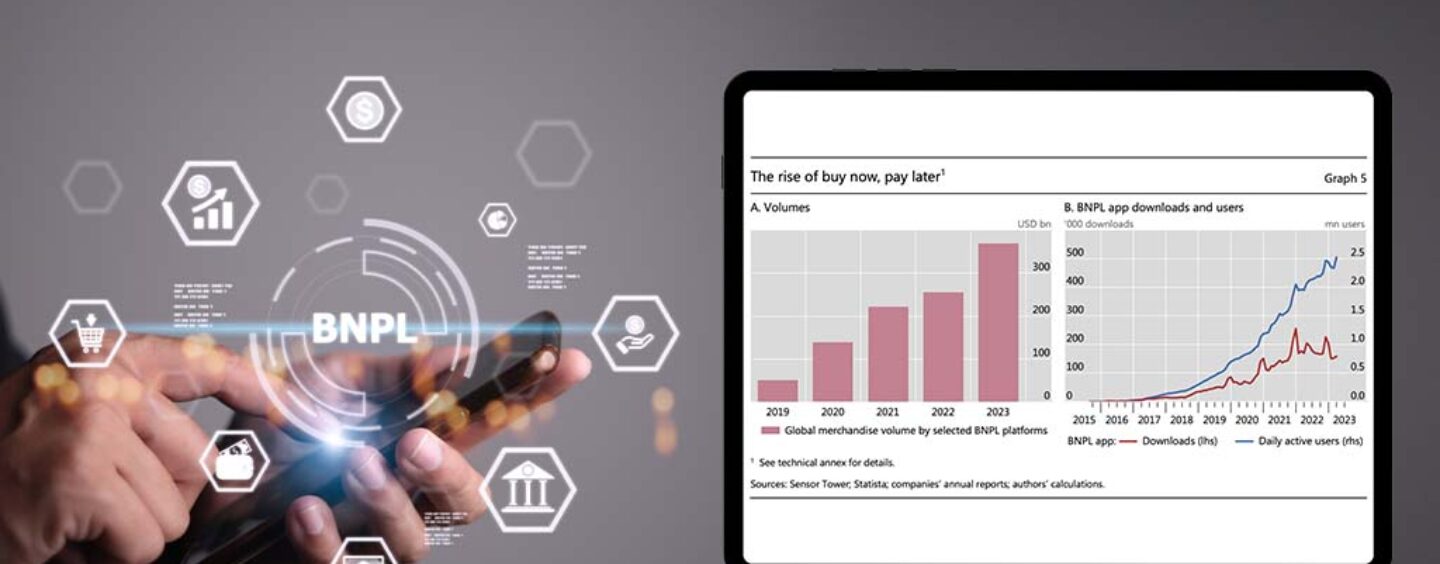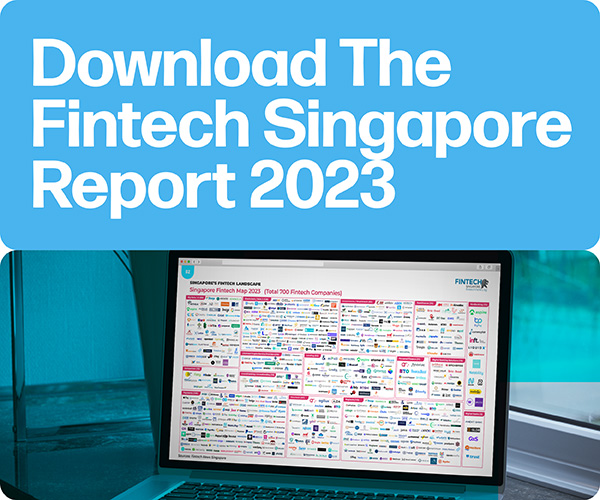Buy now, pay later (BNPL) arrangements, a type of short-term financing that allows customers to make purchases and pay for them in monthly installments, are growing strongly around the world, picking up steam among both customers and merchants. But despite increased adoption of these novel payment methods, BNPL profitability remains a challenge, hampered by high fixed costs, increasing funding expenses and elevated delinquency rates, a new report by the Bank for International Settlements (BIS) says.
The report, titled “Buy now, pay later: a cross-country analysis” and released by BIS, looks at different BNPL payment schemes, providing an overview of their business models, discussing the benefits and costs for each agent, and mapping the typical profile of users utilizing these products.
According to the report, adoption of BNPL arrangements is growing particularly fast among younger adult generations, who are enjoying the advantages of immediate purchases with deferred payments at no added cost. Merchants, meanwhile, are benefiting from increased conversion rates, a broadened customer base, and higher average transaction value by offering BNPL payment options.
Between 2019 and 2023, global BNPL activity, measured by gross merchandise value (GMV), increased over sixfold, soaring from about US$50 billion to surpass US$350 billion, the report shows. During the period, a similar growth pattern in BNPL app use was observed, which grew from just a little over 250k daily active users in early 2019 to 2.5 million in 2023.
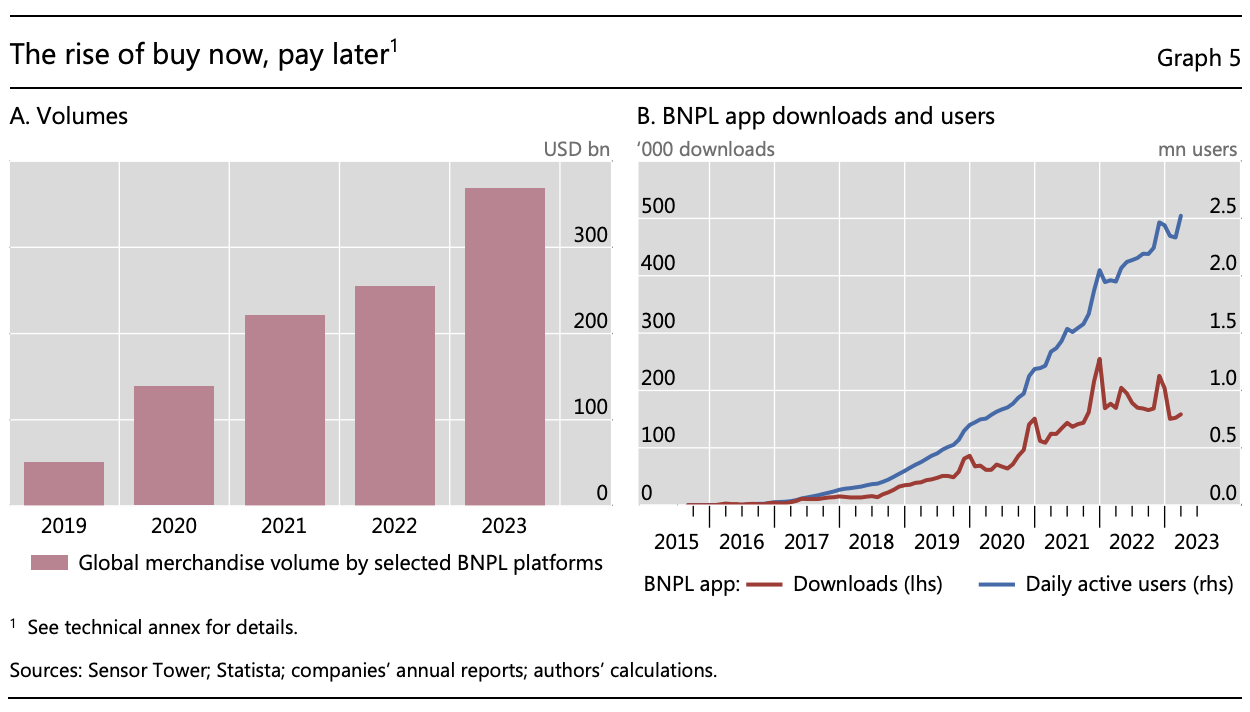
The rise of buy now, pay later (BNPL), Source: Buy now, pay later: a cross-country analysis, Bank for International Settlements, Dec 2023
Looking at users’ profiles, the report says that BNPL customers tend to be typically younger, with less education. There is also evidence in the US that BNPL users tend to have a riskier credit profile than those of traditional consumer credit products.
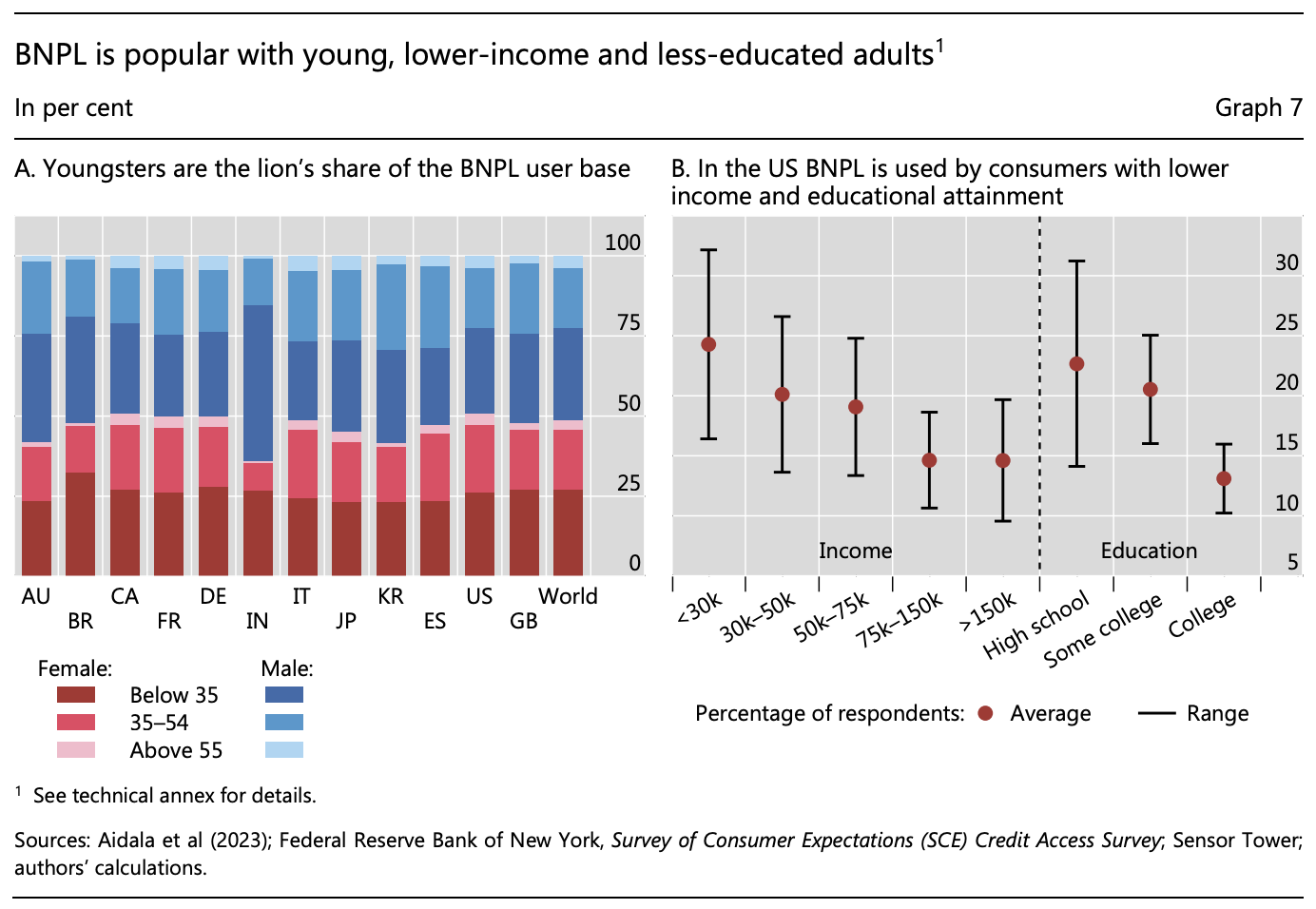
BNPL is popular with young, lower-income and less-educated adults, Source: Buy now, pay later: a cross-country analysis, Bank for International Settlements, Dec 2023
A 2022 report by the US Consumer Financial Protection Bureau (CFPB) found that, on average, BNPL borrowers are much more likely to be highly indebted, revolve on their credit cards, have delinquencies in traditional credit products and use high-interest financial services such as payday, pawn, and overdraft compared to non-BNPL borrowers.
These consumers are also more likely to have traditional credit products like credit and retail cards, personal loans, and student loans, but have lower liquidity and savings compared to non-BNPL borrowers. These findings suggest that BNPL arrangements are most appealing to individuals who are financially vulnerable, posing risks such as accumulating debt and late fees.
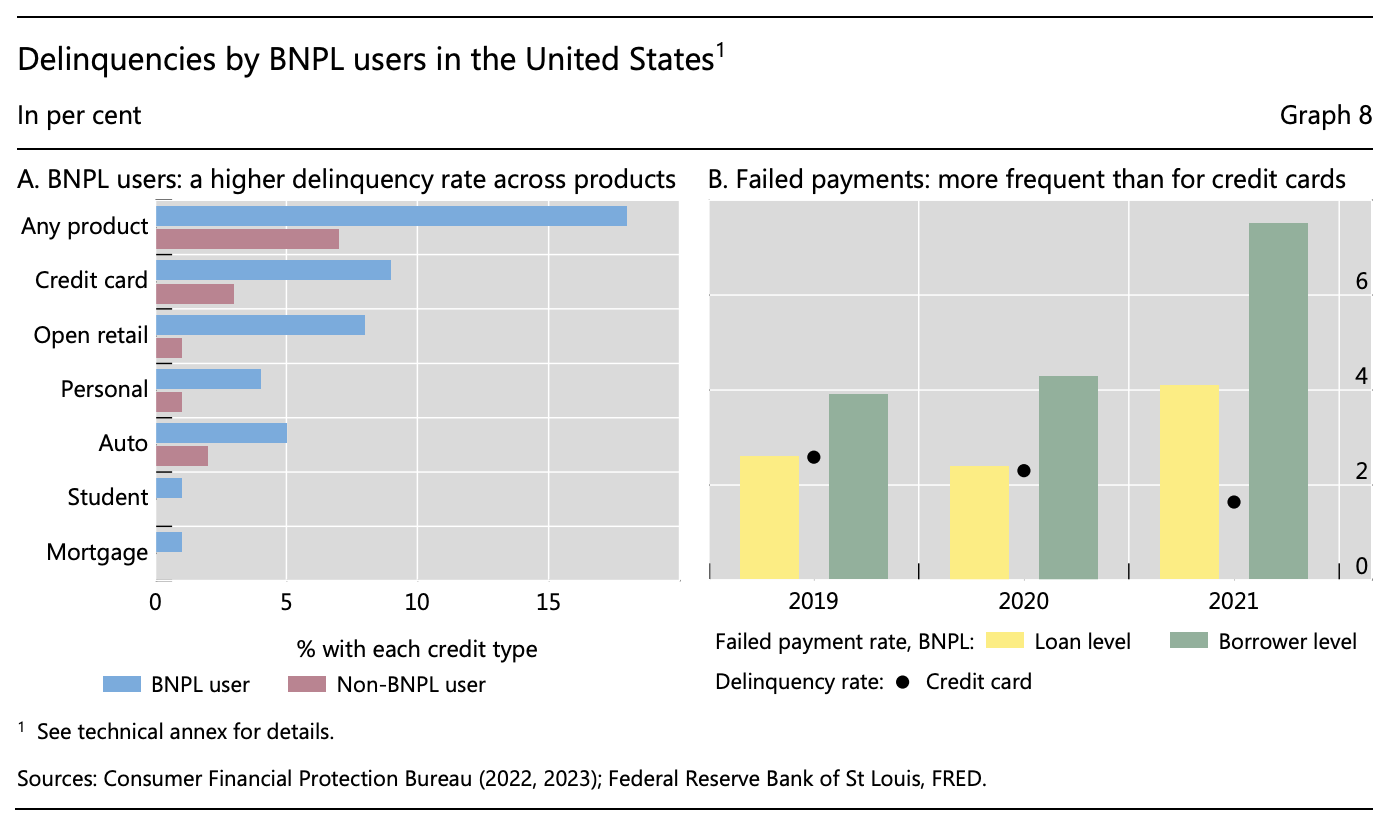
Delinquencies by BNPL users in the USA, Source: Buy now, pay later: a cross-country analysis, Bank for International Settlements, Dec 2023
Increased merchant adoption
Adoption of BNPL is also increasing among merchants, which are benefiting from increased conversion, an expanded customer base and increased average ticket size. BNPL options can reduce hesitation, encourage immediate purchasing decisions and lead customers to spend more per transaction. These arrangements can also attract a broader customer base and give merchants a competitive edge.
Finally, since BNPL platforms assume the credit and fraud risks associated with the transactions, merchants are protected from potential financial losses due to non-payment or fraudulent activities.
Merchant adoption of BNPL varies across jurisdictions, the report says, standing at a high of a 50% penetration rate in the Czech Republic to a low of about 10% in India.
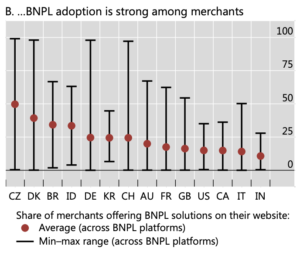
Merchants widely adopt BNPL solutions, Source: Buy now, pay later: a cross-country analysis, Bank for International Settlements, Dec 2023
BNPL is a type of installment loan that involves a customer, a merchant and a BNPL platform. When a customer chooses a BNPL option during the checkout process, they go through a quick application process. The BNPL platform then assesses their creditworthiness through a soft credit check. Once the platform approves the credit line, it pays the merchant the full amount of the goods purchased, thus taking on the customer’s credit risk. Customers pay the first installment upfront to the platform, while the residual amount is typically due in weekly installments.
BNPL arrangements differ from traditional consumer credit in that they are extended on the basis of less information. Also, BNPL credit is typically not communicated to credit bureaus and, consequently, does not affect a consumer’s credit score. In addition, late payments may not be recorded, but severe delinquencies could be.
Are BNPL companies profitable?
But despite increased adoption among both consumers and merchants, BNPL profitability remains challenging due to high operating costs for marketing, administrative and technology expenses, which have prevented them from breaking even since 2018, the report says. In addition, BNPL firms are struggling to generate profits from their assets because of rising credit losses and intensified competition from neobanks and bigtechs entering the BNPL market.
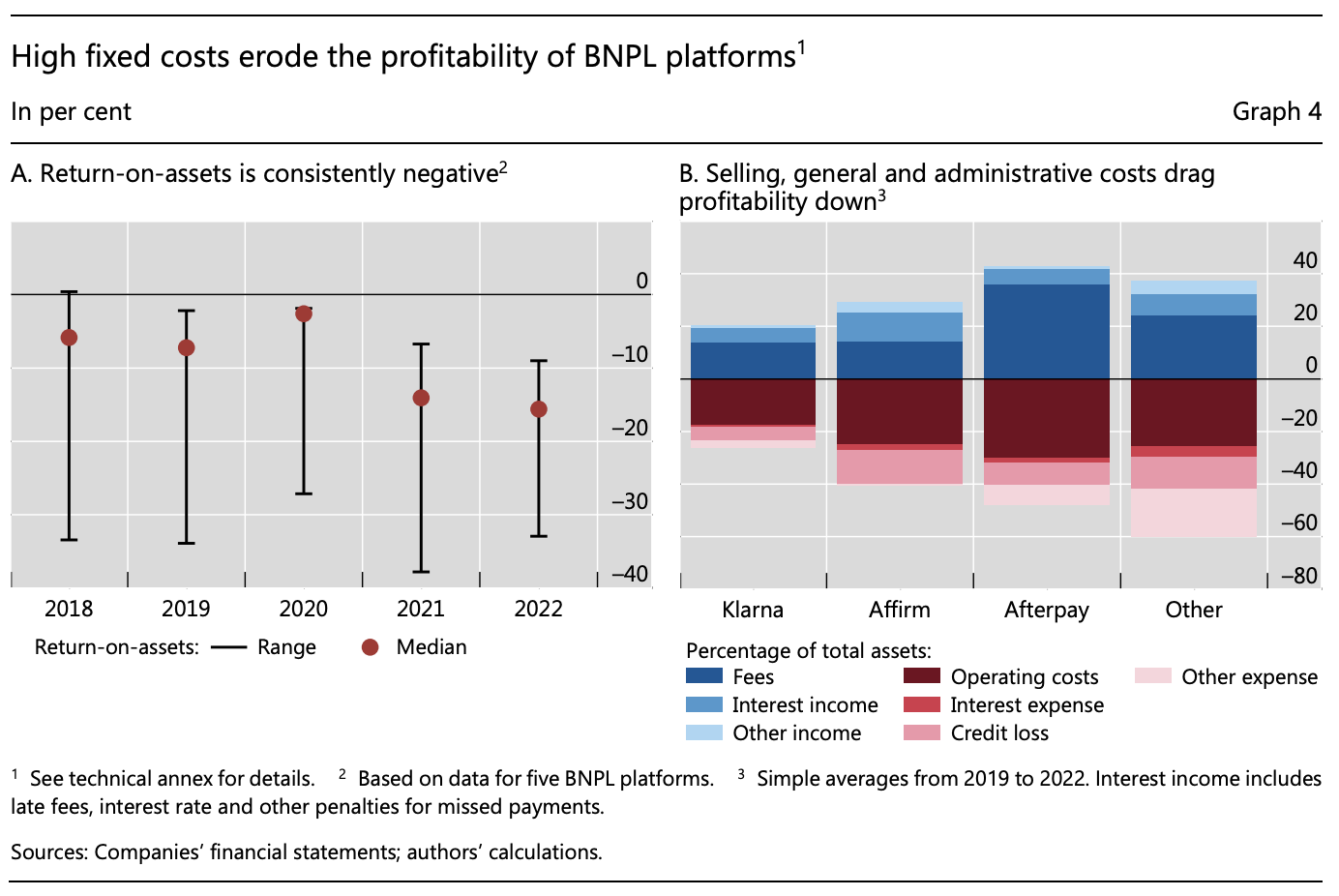
High fixed costs erode the profitability of BNPL platforms, Source: Buy now, pay later: a cross-country analysis, Bank for International Settlements, Dec 2023
Although these findings corroborate with what has been observed in the market, BNPL platforms have committed to cutting costs, improving financial performances and focusing on profitability.
Swedish BNPL leader Klarna reported in November its first quarterly profit in four years, posting an operating profit of SEK 130 million (US$12.7 million) in Q3 2023 compared with a loss of SEK 2.1 billion (US$205 million) a year earlier. These strong performances were attributed to reduced credit losses and improvements in underwriting precision and accuracy.
Now that Klarna’s results are seemingly heading in the right direction, the company is reportedly preparing for a possible stock market listing.
Similarly, American BNPL firm, which went public in 2021, reported its second straight quarter of profitability in Q3 2023, generating US$60 million in adjusted operating income, versus a US$19 million loss in Q3 2022. Adjusted operating margin stood at 12% during the period compared to -5% during Q3 2022.
Featured image credit: Edited from freepik
- SEO Powered Content & PR Distribution. Get Amplified Today.
- PlatoData.Network Vertical Generative Ai. Empower Yourself. Access Here.
- PlatoAiStream. Web3 Intelligence. Knowledge Amplified. Access Here.
- PlatoESG. Carbon, CleanTech, Energy, Environment, Solar, Waste Management. Access Here.
- PlatoHealth. Biotech and Clinical Trials Intelligence. Access Here.
- Source: https://fintechnews.sg/82398/lending/bnpl-profitability-elusives-rising-adoption/
- :has
- :is
- :not
- $UP
- 1
- 130
- 20
- 2018
- 2019
- 2021
- 2022
- 2023
- 250K
- 300
- 500
- 600
- 7
- a
- About
- accuracy
- across
- active
- activities
- activity
- added
- addition
- Adjusted
- administrative
- adopt
- Adoption
- Adult
- adults
- advantages
- affect
- Agent
- AI
- allows
- also
- American
- among
- amount
- an
- analysis
- and
- app
- appealing
- Application
- ARE
- around
- AS
- assesses
- Assets
- associated
- assume
- At
- attract
- author
- average
- Bank
- base
- basis
- BE
- been
- begin
- benefiting
- benefits
- Billion
- bis
- BNPL
- borrowers
- both
- Breaking
- broader
- Bureau
- business
- business models
- but
- buy
- by
- CAN
- caps
- Cards
- CFPB
- challenge
- challenging
- check
- Checkout
- committed
- communicated
- Companies
- company
- compared
- competition
- competitive
- Consequently
- consumer
- Consumer Financial Protection Bureau
- Consumers
- content
- Conversion
- corroborate
- Cost
- Costs
- could
- credit
- Credit Cards
- credit check
- CREDIT LINE
- customer
- Customers
- cutting
- czech republic
- daily
- Debt
- dec
- decisions
- Despite
- differ
- different
- direction
- discussing
- does
- due
- during
- each
- Earlier
- Early
- Edge
- Education
- elevated
- encourage
- end
- enjoying
- entering
- Even
- evidence
- expanded
- expenses
- extended
- FAST
- Fees
- financial
- Financial Protection
- financial services
- financially
- financing
- findings
- fintech
- Fintech News
- Firm
- firms
- First
- fixed
- focusing
- For
- form
- four
- fraud
- fraudulent
- from
- FT
- full
- funding
- generate
- generations
- Give
- Global
- Go
- goods
- grew
- gross
- Growing
- Growth
- Have
- Heading
- High
- higher
- highly
- hottest
- HTTPS
- image
- immediate
- improvements
- improving
- in
- Income
- increased
- increasing
- india
- individuals
- information
- installment
- International
- international settlements
- IT
- ITS
- jpg
- jurisdictions
- just
- Klarna
- Late
- later
- lead
- leader
- less
- like
- likely
- Line
- Liquidity
- listing
- little
- loan
- Loans
- LOOKS
- loss
- losses
- Low
- lower
- mailchimp
- make
- mapping
- Margin
- Market
- Marketing
- max-width
- May..
- Meanwhile
- merchandise
- Merchant
- Merchants
- methods
- million
- models
- Month
- monthly
- more
- most
- much
- Neobanks
- New
- news
- no
- novel
- November
- now
- of
- offering
- on
- once
- operating
- Option
- Options
- or
- over
- overview
- particularly
- Pattern
- Pay
- payment
- payment methods
- payments
- pays
- penetration
- per
- performances
- period
- personal
- picking
- platform
- Platforms
- plato
- Plato Data Intelligence
- PlatoData
- Popular
- possible
- Posts
- potential
- Precision
- process
- Products
- Profile
- Profiles
- Profit
- profitability
- profitable
- profits
- protected
- protection
- providing
- public
- purchased
- purchases
- purchasing
- Q3
- q3 2022
- Quarter
- quarterly
- Quick
- Rate
- Rates
- recorded
- reduce
- Reduced
- remains
- report
- Reported
- Republic
- Results
- retail
- Reuters
- right
- Rise
- rising
- Risk
- risks
- Savings
- says
- schemes
- score
- Second
- seemingly
- sek
- Services
- Settlements
- severe
- short-term
- Shows
- similar
- since
- Singapore
- Size
- soaring
- Soft
- Solutions
- Source
- spend
- standing
- Steam
- stock
- stock market
- straight
- strong
- strongly
- Struggling
- Student
- such
- suggest
- surpass
- taking
- Technology
- tend
- than
- that
- The
- the world
- their
- Them
- then
- There.
- These
- they
- those
- Through
- Thus
- ticket
- titled
- to
- traditional
- transaction
- Transactions
- type
- typical
- typically
- underwriting
- us
- USA
- use
- users
- Utilizing
- value
- Versus
- Vulnerable
- was
- weekly
- went
- were
- What
- when
- which
- while
- WHO
- widely
- with
- world
- year
- young
- Younger
- Your
- zephyrnet


